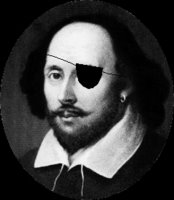 Out of all of the Bard’s plays, only one is “original.” The original play is A Midsummer's Night Dream. All the other plays—tragedies, comedies and histories—are based on various “sources”. In other words, Shakespeare copied other people’s work. He was a pirate of sorts. Today, we copyright intellectual property. That is why Da Vinci Code author Dan Brown is in court for plagiarizing Holy Blood, Holy Grail. You cannot copy someone else’s idea and publish a best seller. Yann Martel, author of the best seller Life of Pi, a novel about a tiger in a boat with a boy, was also accused of plagiarizing Brazilian author Moacyr Scliar’s novel—which is also about a tiger in a boat with a boy.
Out of all of the Bard’s plays, only one is “original.” The original play is A Midsummer's Night Dream. All the other plays—tragedies, comedies and histories—are based on various “sources”. In other words, Shakespeare copied other people’s work. He was a pirate of sorts. Today, we copyright intellectual property. That is why Da Vinci Code author Dan Brown is in court for plagiarizing Holy Blood, Holy Grail. You cannot copy someone else’s idea and publish a best seller. Yann Martel, author of the best seller Life of Pi, a novel about a tiger in a boat with a boy, was also accused of plagiarizing Brazilian author Moacyr Scliar’s novel—which is also about a tiger in a boat with a boy.Whatever you think of Dan Brown’s writing and whether he plagiarized or not, Shakespeare clearly did. But so did everyone else writing in his day. Authors understood that creativity does not occur in a vacuum. They recognized that their craft depends on the craft of others who have gone before them. Only God creates Ex Nihilo. All artists have, in the end, copy God's creativity. Consequently, all writers have sources. Even C.S. Lewis's The Lion, the Witch and the Wardrobe was inspired by Roger Lancelyn Green's never published, "The Wood that Time Forgot", about children entering an enchanted wood and encountering a fallen angel. He was also inspired by the works of George Macdonald and J.R.R. Tolkien. There are many similarities and common threads in Lewis's Narnia books that can be clearly linked to Lewis's sources.
Building off of other's ideas is not a sign of an author's lack of ability as a writer. In fact, it confirms his ability. We celebrate Shakespeare’s version of Romeo and Juliet, not Matteo Bandello’s novella Giulietta e Romeo (1554), or William Painter’s The Palace of Pleasure(1580) or the poem by Arthur Brooke called "The Tragicall Historye of Romeus and Iuliet", written in 1562. Shakespeare took these stories and he added breadth and depth of human experience. He changed events, developed characters and enriched the stories with his observations of the human condition. Shakespeare made his sources into better stories that have endured.
Additional confirmation of Shakespeare’s success is the amount of works that have "plagiarized" Shakespeare. Shakespeare's plays have inspired countless creative endeavors—music, art, plays, novels, poems, films, TV shows, etc. Even in the 21st Century, Shakespeare permeates our popular culture. In addition, each year hundreds of Shakespeare plays are still being performed all over the world. What a playwright!





1 comment:
On a related note about borrowing from Shakespeare... if you have ever watched the old SCTV "Bob & Doug McKenzie" comedy skits you may have watched their feature film, Strange Brew. It came out in the eighties. It is the quintessential Canadian film (i.e., poorly filmed, low budget, self-abasing, etc). It is also based (loosely) on Hamlet. Bob & Doug are “Rosencrantz” and “Guildenstern” and they drink “Elsinore” beer. The eaves dropping theme is explored with surveillance cameras in the brewery. Even the murdered brewery owner (Hamlet's father) shows up as an apparition in the film. There are countless references to Hamlet in the film (as well as to Star Wars; go figure). It is not a “great” film but it is strangely Canadian—what other nation on the planet would use the plot from one of the world’s greatest tragedies as blueprint for a comedy? Strange Brew indeed.
Post a Comment